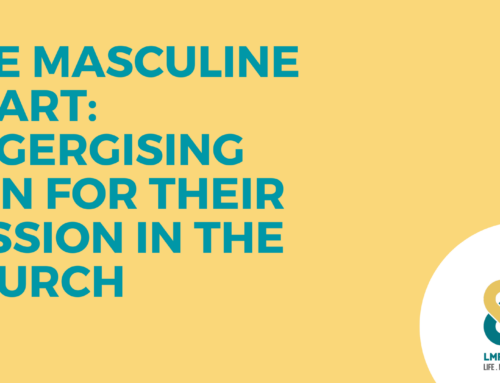
Dr Peter Holmes
Biography
Raised an evangelical, Peter Holmes trained and served as a Lutheran minister before working in counselling, consulting and teaching roles in the Catholic Archdioceses of Melbourne and Sydney. A senior Lecturer in Theology at the University of Notre Dame, Peter lectures in Scripture, marriage and sexuality, Theology of the Body, and biblical languages (Hebrew and Greek). He is married to Susan, with eight children and one grandchild.
The Church teaches us that every person is made in the image of God. A person’s spousal nature is an essential element of this imaging of divine love. The part of us that is ordered to and finds fulfilment in self-giving love for others is a participation in God’s own nature. This means that the grasping, using nature of pornography is more than a moral problem. It cuts to the heart of our being and purpose. But the Scriptures teach us that the Christian answer is not prudery, but joyful delight in the love God has invited us to share.
Transcript
I want to divide today into three parts.
- The first thing I want to talk to you about is us made in the image of God and what that means about our spousal love.
- The second part I want to talk to you about is the Song of Songs and some of the things we’ve already heard talked about in terms of the vision of spousal love in the scriptures.
- The third part is a little bit of a challenge to all of us which I hope I get away with.
The Image of God
The image of God, right at the very beginning in Genesis the Bible says “God created mankind in his own image, in the image of God he created them; male and female he created them.”
Now if you follow the Hebraic structure there, that means all the other parts of that poem are lined up with something as a parallel and the male and female part is lined up with the image of God. So, the relationship between male and female there is what’s being put in Genesis, as the image of God. The way in which we give ourselves in spousal love, is actually imaging God.
Now Saint Pope John Paul ll we’ve heard quoted a lot but he picks up what the church fathers say on this and says actually, it’s more than just imaging God, we’re proclaiming God, we’re preaching God, we’re showing the whole world what God’s love might be a little bit like. And we do a poor job of it. but that love, that’s the purpose of this love.
In fact, Saint Pope John Paul ll takes it further and says every relationship we have is a miniature version of this self-giving love which we give. And so, the way we approach the spousal love ends up shaping not just how we treat that one person or several people maybe but everybody, the way we regard everybody. So this has implications for every relationship and because we’re proclaiming God, preaching God, declaring the nature of God with every single act, or the way we give ourselves. If we do it in a way that is false, which is against God it’s actually a form of false preaching or even blasphemy in some respects.
So theologically, (I’m talking here as a theologian), theologically speaking this is more than merely, and I don’t want to play down the moral implications but, it’s more than merely the damage we do to one or two people or even to ourselves or all those other things. It’s actually a profound problem John Paul ll points out because we’re not proclaiming the love of God and the nature of God to a world that desperately needs it.
This is a really important element of what we’re talking about here. So, let’s talk about what kind of love we’re talking about?
Spousal Love in the Scriptures
God is a spousal God. He declares himself the husband of Israel in the Old Testament. When Israel goes off the tracks, the prophets call Israel nasty names which I’m not allowed to repeat in a public place. Mostly meaning that she’s an unfaithful bride. The spousal image is used all the way through the Old Testament. In the New Testament Christ is the bridegroom and the Church is the bride. All of these images are very common in the scriptures and that means that these are the very models of how we actually bring the Christian ideals and the declarations about God’s nature to the world.
So, what is God like? God is a jealous God, and we’ve always known that in terms of the spousal capacity he jealously guards the intimate and proper relationship he has with people. He won’t give us up to false gods, he won’t give us up to false things that are going to take us somewhere else, that are going to actually undermine our own flourishing. He wants us to flourish fully, so he calls us into proper relationship with him. Something that John Paul ll, and much more clearly Pope Benedict, has done in Deus caritas est, is say that this spousal love is not just a kind of a permissible side of effect of love and Pope Benedict points out we often look at eros as if it’s a dangerous animal that we put in a box and so long as we surround it with agape it’s safe.
Pope Benedict says no, this seeking love, this passionate love, this driving powerful potential that we have, this very specific love is a mirror and an image of God’s seeking you out. The particularity of God’s love that it comes down and is hungry for a relationship. So, in particular, I paid attention to this my thesis is on masculinity and one of the chapters of my book is on this. That the only parts of John Paul ll’s theology the body that specifically says masculinity is different is in the area of desire. Masculine desire, the seeking passionate love which if misplaced can be disastrous, as we know, but when properly placed is the very essence and power of God’s love at work in the world.
I’ve done a bit of work on the side with other people about why aren’t men involved in the church and you know what most of it is because they’re spending almost all of their passion and power, mostly in this area.
Because you can’t do that and have all the extra passion and power for the good, the true and the beautiful. Whatever they have got left is being sucked away by companies that’s another question we’ll have. Another conversation we’ll have. So, what does the Bible say about sexuality? One thing I want to say about reading the Bible in Hebrew is it made me realize how badly we’ve been served by English translations.
Most of the English translations followed the lead of the King James which was translated in a time heavily influenced by the Puritans and so those sections of the prophets that I talked about where the prophets get very explicit about their insults about Israel and their unfaithfulness. They are all neutered carefully curated, carefully what this called censored, to be correct language.
So let me give you an example at the risk of scandalizing you. In the Song of Songs several times the man describes the woman as a hymn of praise to God. He describes every part of her, and he goes down her body systematically and describes every part of her explicitly. And the woman turns around and describes the man, his face is like this, his chest is like this, his arms are like this, and she gets to his body and the English translations say his ‘torso is like ivory’ and the Hebrew says his ‘loins are like an elephant’s tusk’.
Now the reason I’m telling you this is that all the Song of Songs is that explicit not as if it’s a naughty thing but it’s joyfully explicit. In the proper context there’s a joy in this spousal love. There’s an outpouring of just “this is wonderful” and here’s something even more scary for Western Minds this letter this song of songs is read aloud, in full, in Hebrew, so no censorship as the family preparation for the Passover each year.
And in the Sephardic Jewish tradition it’s read every Friday night in preparation for the Sabbath, because it is this spousal love. I mean Song of Songs is literally a song celebrating two people who are about to get married, and they’re really excited about it.
It’s a proper and joyful expression of spousal love it’s the proper context and the proper expression now what I want to say in this is: We need to recapture that joy and bring it home in terms of our teaching and our sharing.
So, I’ll tell you a brief story I wasn’t going to do this but, we have the time. So once I was called in by a school to give a talk on the Church’s teaching on marriage and sexuality in two hours.
I found out later was because the teacher didn’t believe the Church’s teachings and they she wanted to set me up and then knock me down. So, I came in and I saw all of these year 10 boys, 30 something of them, and they were all sitting there in the room looking not interested. I had a pile of notes, and I thought this isn’t going to work. I threw the notes aside prayed and said “God wants you to have the best sex life possible”, and they all sat up straight! They’re used to people telling them not to do things, to not feel things, to not go places. So when I said this, they thought “Hang on this church guy is telling me God wants me to flourish in this area? He wants me to have the most amazing sex life?”, … and we had a conversation at that point. I said “So, what makes for great sex?”
They were year 10 boys, so it was a long hour! The point is, when we actually got past their silliness, I asked “Is it good when she’s with you, but then she wants to be with Bill next?” “Oh no that sucks.” “What if what if she wants to be with you on Tuesday and Bill…” “Oh no, that sucks too!” And when we eliminated all the things that would hurt them. I said “So what we’ve got here, is someone who stays just with you, no one else and they don’t leave you and practice all the time. Do you know that looks awfully like something the church calls marriage?”
The point is, you can start this conversation from the positive vision, the joyful vision, what is God actually calling you to. He is calling you beyond the negatives into the positives, right? That’s the key. We actually have the best-selling point! This is what we’re made for. Literally we are Divine imitators in this spousal love and that’s what it should be. Unfortunately the image out there is the church is all about “no, no, no.”
A Challenge
So, I am going to end with this. The Prodigal Son parable is one that perhaps might shed some light on us as people who respond to this.
There are two sons. The first son goes out, and you’d have to say he emphatically seeks his own gratification. He goes out it’s all about his fun and at the expense of every meaningful relationship in his life. He throws it all away and he very quickly gets finds himself in the bottom of the pigsty realizing “I’m in nowhere land.” He goes back to dad, not to say sorry, by the way, he’s just negotiating a slightly less gratifying, but better than the pigsty, outcome. But dad comes out and welcomes him back, throws the arms around and him. We know that story and we know what it represents for us, that we welcome anybody who wants to come home, even if their motives aren’t quite pure even if they’re just saying this really sucks and we’re trying to bring them back. But here’s the one I want to throw at you, the oldest son won’t come to the party, why?
Because he resents that the younger son has blown everything and gets welcomed back. When he speaks to his father, we get a revelation that he has had almost the same attitude as the youngest son. He says “All these years I have slaved for you, and you’ve not given me a party.” In other words, I’ve been doing the right thing I’ve been at home. I’ve done all the right things, and I haven’t got the thrills. And what is the father’s response? “Everything I have is yours.” It’s not “You don’t need a party over there”. It is “With me, everything I have is yours.” The invitation goes out to both the older and the younger sons. In some respects we have a big problem with people who gone after the gratification and found themselves in the pigsty but we’ve also got a problem with people who have the attitude of your leftovers from English puritanism where prudishly just hanging on white knuckling it through this because there’s a reward somewhere and there’s a deep resentment there for any kind of attempt at joy.
Both need to be brought in, and the only reason porn is successful is because we are not offering the joy as an alternative to self-gratifying pleasure.
Those Jewish families I talked about they have a much lower rate of kids falling for sexual abuse because when someone presents them with a secret sort of temptation, they know it’s false because they’ve seen the real thing, in its proper context, in the joyful celebration of marriage. They also know not to fall for the pornography thing because it’s also the false presentation. The attraction of porn is that kids are being shown something that no one else has talked to them about. And if they have talked to them about it, it’s all “no, no, no. don’t go there!” But if we have this discussion in the context of the joy and fulfillment and that this is what we’re made for. That’s the context in which we can offer a genuinely different approach, a genuinely joyful and healing approach. Thank you.
DEUS CARITAS EST
Three main points from this talk:
Made in the Image of God: Dr Holmes discusses how being created in the image of God (Genesis 1:27) reflects in spousal love. This love is a profound expression of God’s nature, emphasizing that every relationship we have should embody self-giving love, showcasing God’s love to the world.
The Song of Songs: Explores the celebration of spousal love in the Scriptures, particularly in the Song of Songs, which presents an explicit and joyful expression of love. This text is highlighted as a model for understanding healthy relationships and sexuality, countering negative cultural perceptions.
Invitation to Joy: Dr Holmes challenges the negative attitudes surrounding sexuality often found in religious contexts, advocating for a positive vision of love and intimacy. By presenting the joy and fulfilment of authentic relationships, the talk suggests that this approach can combat harmful influences like pornography and help people understand the true meaning of spousal love.





